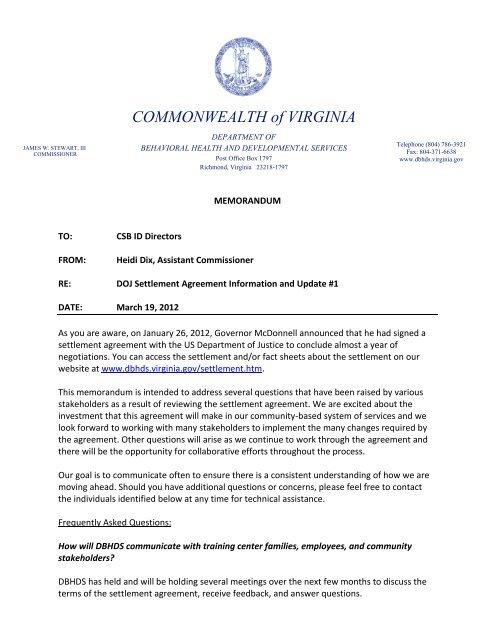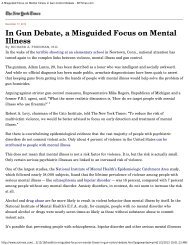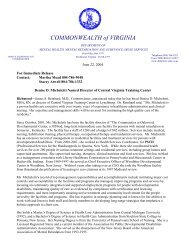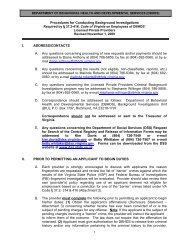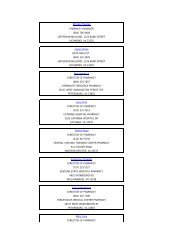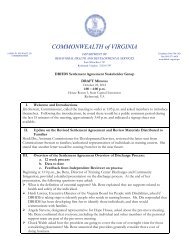DOJ Settlement Agreement Information and Update #1 - Virginia ...
DOJ Settlement Agreement Information and Update #1 - Virginia ...
DOJ Settlement Agreement Information and Update #1 - Virginia ...
You also want an ePaper? Increase the reach of your titles
YUMPU automatically turns print PDFs into web optimized ePapers that Google loves.
JAMES W. STEWART, III<br />
COMMISSIONER<br />
TO: CSB ID Directors<br />
COMMONWEALTH of VIRGINIA<br />
DEPARTMENT OF<br />
BEHAVIORAL HEALTH AND DEVELOPMENTAL SERVICES<br />
Post Office Box 1797<br />
Richmond, <strong>Virginia</strong> 23218-1797<br />
MEMORANDUM<br />
FROM: Heidi Dix, Assistant Commissioner<br />
RE: <strong>DOJ</strong> <strong>Settlement</strong> <strong>Agreement</strong> <strong>Information</strong> <strong>and</strong> <strong>Update</strong> <strong>#1</strong><br />
DATE: March 19, 2012<br />
As you are aware, on January 26, 2012, Governor McDonnell announced that he had signed a<br />
settlement agreement with the US Department of Justice to conclude almost a year of<br />
negotiations. You can access the settlement <strong>and</strong>/or fact sheets about the settlement on our<br />
website at www.dbhds.virginia.gov/settlement.htm.<br />
This memor<strong>and</strong>um is intended to address several questions that have been raised by various<br />
stakeholders as a result of reviewing the settlement agreement. We are excited about the<br />
investment that this agreement will make in our community-based system of services <strong>and</strong> we<br />
look forward to working with many stakeholders to implement the many changes required by<br />
the agreement. Other questions will arise as we continue to work through the agreement <strong>and</strong><br />
there will be the opportunity for collaborative efforts throughout the process.<br />
Our goal is to communicate often to ensure there is a consistent underst<strong>and</strong>ing of how we are<br />
moving ahead. Should you have additional questions or concerns, please feel free to contact<br />
the individuals identified below at any time for technical assistance.<br />
Frequently Asked Questions:<br />
How will DBHDS communicate with training center families, employees, <strong>and</strong> community<br />
stakeholders?<br />
DBHDS has held <strong>and</strong> will be holding several meetings over the next few months to discuss the<br />
terms of the settlement agreement, receive feedback, <strong>and</strong> answer questions.<br />
Telephone (804) 786-3921<br />
Fax: 804-371-6638<br />
www.dbhds.virginia.gov
CSB ID Directors<br />
Page 2<br />
We are in the process of completing meetings with all training center employees on all shifts<br />
affected by the proposed closures.<br />
We are also meeting with family members of those individuals that live at the training centers<br />
to discuss the agreement. We will be meeting with each Region’s CSB Executive Directors <strong>and</strong><br />
ID Directors in March <strong>and</strong> April. We are in the process of planning meetings with community<br />
providers, TACIDD <strong>and</strong> self-advocates for April <strong>and</strong> May. We will share information about the<br />
dates, times, <strong>and</strong> locations of these meetings within the next few weeks. We intend to establish<br />
multiple mechanisms for stakeholder input as we move forward over the coming months <strong>and</strong><br />
years. More guidance will be forthcoming on this topic this spring. In addition, DBHDS will<br />
continue to update <strong>and</strong> exp<strong>and</strong> its webpage, www.dbhds.virginia.gov/settlement.htm as more<br />
information becomes available so that interested parties can access information at any time.<br />
What is the Target Population of the <strong>Settlement</strong> <strong>Agreement</strong>?<br />
The Target Population is defined in the <strong>Settlement</strong> <strong>Agreement</strong> as individuals with ID/DD who<br />
meet any of the following criteria:<br />
a. Are currently residing at any of the Training Centers;<br />
b. Who (i) meet the criteria for the wait list for the ID waiver or (ii) meet the criteria for the<br />
wait list for the DD waiver; or<br />
c. Currently reside in a nursing facility or ICF.<br />
Individuals who fall into categories (a) through (c) will remain in the target population for the<br />
duration of the agreement, regardless of the setting they may move to or whether they obtain<br />
a waiver slot.<br />
To the extent children meet any of the above criteria; they would be included in the target<br />
population. <strong>Virginia</strong> cannot exclude individuals from the target population because they have<br />
co-occurring mental illness, TBI, or other neurological conditions or forensic involvement.<br />
How will waiver slots created by the <strong>Settlement</strong> <strong>Agreement</strong> be distributed?<br />
The <strong>Settlement</strong> <strong>Agreement</strong> establishes a set number of slots to be created each fiscal year. The<br />
805 slots for Training Center residents will be managed by Central Office in partnership with<br />
training center leadership <strong>and</strong> will be distributed based on the annual schedule in the<br />
<strong>Agreement</strong>.
CSB ID Directors<br />
Page 3<br />
The 2,915 community ID waiver slots will be assigned <strong>and</strong> distributed on an annual basis using<br />
st<strong>and</strong>ard Office of Developmental Services procedures. The 450 IFDDS waiver slots will be<br />
distributed on an annual basis using st<strong>and</strong>ard DMAS procedures.<br />
There are slots prioritized each year in FY13, FY14, <strong>and</strong> FY15 in both the ID <strong>and</strong> IFDDS waiver for<br />
children under 22 years of age transitioning from nursing facilities <strong>and</strong> large ICFs. DBHDS <strong>and</strong><br />
DMAS will be developing guidance about how these slots will be distributed.<br />
How will the individual <strong>and</strong> family supports program be operated <strong>and</strong> funds distributed?<br />
The individual <strong>and</strong> family supports program is a state general fund program intended to provide<br />
minimal supports to individuals <strong>and</strong> families who are on the wait list for ID <strong>and</strong> DD waiver slots<br />
<strong>and</strong> do not have access to other supports through EPSDT or the EDCD waiver. The program<br />
could provide, depending on the final budget approved by the General Assembly, up to $3000<br />
in annual support to families. Individuals <strong>and</strong>/or families would be required to apply for the<br />
support on an annual basis with assistance from their case manager. DBHDS (<strong>and</strong> DMAS where<br />
applicable) would review <strong>and</strong> approve the applications <strong>and</strong> funding amounts. DBHDS will be the<br />
lead in developing <strong>and</strong> implementing this program, which is slated to begin during FY13. We<br />
will be working with stakeholders to develop this program. More information about the<br />
program <strong>and</strong> opportunities to participate in its development will be forthcoming.<br />
Does the <strong>Settlement</strong> <strong>Agreement</strong> prohibit individuals from residing in congregate settings with<br />
five or more beds?<br />
The <strong>Settlement</strong> <strong>Agreement</strong> does not prohibit individuals from residing in congregate settings<br />
with five or more beds now or in the future. Congregate settings of five or more beds are<br />
permissible, including community ICFs <strong>and</strong> group homes, as long as individuals in the target<br />
population have been provided with community living options available to meet their support<br />
needs <strong>and</strong> have made an informed choice.<br />
The <strong>Agreement</strong> establishes a structure for Community Resource Consultants or Community<br />
Integration Managers to review placements in congregate settings of five or more individuals in<br />
consultation, in some cases, with Regional Support Teams (defined below). The review is<br />
intended to examine whether an individual in the target population <strong>and</strong> their authorized<br />
representative/guardian was given an informed choice of community placement options.<br />
DBHDS will be working with CSBs over the next few months to develop the CRC-CIM-Regional<br />
Support Team structure. We will issue guidelines for how Regional Support Teams will operate.<br />
The structure is intended to complement existing Regional ID <strong>and</strong> Admissions Management<br />
Committee infrastructures.
CSB ID Directors<br />
Page 4<br />
Community Resource Consultants are DBHDS employees that provide technical support,<br />
training, <strong>and</strong> assistance regarding Medicaid waiver programs <strong>and</strong> other community<br />
services to community providers (both private <strong>and</strong> CSB);<br />
Community Integration Managers are DBHDS employees that provide technical support,<br />
training, <strong>and</strong> assistance to Training Center staff <strong>and</strong> families regarding the Training<br />
Center discharge process; <strong>and</strong><br />
Regional Support Teams are entities established to assist families, CSB case managers,<br />
Community Resource Consultants, <strong>and</strong> Community Integration Managers in identifying<br />
regional support options for individuals that may be difficult to support.<br />
What are the <strong>Settlement</strong> <strong>Agreement</strong> expectations for case management?<br />
The <strong>Settlement</strong> <strong>Agreement</strong> has several requirements related to case management. The primary<br />
requirement is: within 12 months of the effective date of the <strong>Agreement</strong>, case managers shall<br />
meet face-to-face at least every 30 days with individuals who fall into one of the following<br />
categories:<br />
1. Receive services from providers having conditional or provisional licenses;<br />
2. Have more intensive behavioral or medical needs as defined by the Supports Intensity<br />
Scale category representing the highest level of risk to individuals;<br />
3. Have an interruption of service greater than 30 days;<br />
4. Encounter the crisis system for a serious crisis or multiple less serious crises within a<br />
three month period;<br />
5. Have transitioned from a training center within the previous 12 months; or<br />
6. Reside in congregate settings of 5 or more individuals.<br />
At least one visit every two months to individuals who fall into one of the categories described<br />
above must be in the individual’s place of residence.<br />
DBHDS, in collaboration with DMAS, will be gathering input from CSB case managers <strong>and</strong> DD<br />
case managers to develop definitions, guidelines, <strong>and</strong>/or CSB Performance Contract<br />
modifications regarding these requirements over the next several months. Discussion about<br />
case management <strong>and</strong> the new expectations related to the <strong>Agreement</strong> are an essential part of<br />
implementation. There are also requirements related to gathering data regarding case<br />
management visits <strong>and</strong> case management training that must be implemented. DBHDS will be<br />
working with stakeholders <strong>and</strong> DMAS to gather input regarding these areas <strong>and</strong> ensure<br />
information about these requirements <strong>and</strong> expectations for implementation are clearly<br />
communicated.
CSB ID Directors<br />
Page 5<br />
How will the discharge process at training centers work <strong>and</strong> what role will CSB case managers<br />
play in this process?<br />
Every individual residing at a training center must have a discharge plan by July 1, 2012. The<br />
discharge plan will be developed through the current Personal Support Team (PST) process<br />
currently used by all training centers for annual meetings. CSB case managers, along with the<br />
individual <strong>and</strong> his authorized representative, are expected to participate in these meetings <strong>and</strong><br />
every effort will be made to ensure this participation.<br />
The discharge plan must outline the next steps, <strong>and</strong> timeframes, in moving an individual toward<br />
discharge in a person-centered <strong>and</strong> safe manner. It does not require identification of a specific<br />
community placement by July 1. Training center staff will work closely with CSB case managers<br />
<strong>and</strong> community providers to ensure that all discharge plans are developed with: (1) the<br />
individual <strong>and</strong> authorized representative as a participant;<br />
(2) the unique individual support needs <strong>and</strong> preferences identified; (3) clear discussions of<br />
current, viable community options for placement based on those support needs <strong>and</strong><br />
preferences; <strong>and</strong> (4) appropriate transition planning to ensure safe transition to the<br />
community <strong>and</strong> ongoing support <strong>and</strong> monitoring.<br />
More detailed information about how the training center discharge process will work <strong>and</strong> an<br />
updated Admissions <strong>and</strong> Discharge Protocol will be the subject of a future update in April.<br />
How will <strong>Virginia</strong> ensure community providers are adequately trained to support individuals<br />
with complex medical <strong>and</strong> behavioral needs?<br />
<strong>Virginia</strong> is required by the <strong>Settlement</strong> <strong>Agreement</strong> to implement a statewide core competencybased<br />
training curriculum for all staff who provide services under the <strong>Agreement</strong>. DBHDS is<br />
currently working to develop this curriculum <strong>and</strong> plan for its implementation. <strong>Information</strong><br />
about the training curriculum <strong>and</strong> how training will be made available to community providers<br />
will be shared with stakeholders in the future.<br />
As individuals transition from training centers to the community, training center <strong>and</strong> CSB case<br />
managers will work closely with community providers to ensure that community provider staff<br />
receive complete information on specific support needs of the individual who is transitioning.<br />
What will happen to the training center-operated Regional Community Support Centers when<br />
the training centers close?
CSB ID Directors<br />
Page 6<br />
Regional Community Support Centers are located at each training center in <strong>Virginia</strong> <strong>and</strong> provide<br />
dental services, behavioral consultation, general medical care, <strong>and</strong> other services to individuals<br />
who reside in the community <strong>and</strong> do not have access to medical professionals in their home<br />
community. This important safety net must continue to operate after four of <strong>Virginia</strong>’s training<br />
centers close. DBHDS will present a proposal in FY13 on how to transition this important<br />
function to a community-based operation in all five Regions. The proposal will be developed in<br />
consultation with training center staff that operates the current Regional Community Support<br />
Centers, CSBs, <strong>and</strong> private providers who will be assisting individuals in accessing these<br />
services.<br />
How can we connect with training center employees who could provide support to individuals<br />
in our communities as the training centers downsize <strong>and</strong> close?<br />
DBHDS will be reaching out to community providers over the coming months to discuss how we<br />
can leverage the enormous talent <strong>and</strong> skills of the professionals who now work at our training<br />
centers. These highly trained individuals would be an asset to many community providers<br />
serving individuals with ID <strong>and</strong> DD <strong>and</strong> we hope to collaborate with our community partners to<br />
determine how we can match training center employees to jobs as we downsize. In addition,<br />
DBHDS is working to assist training center employees who wish to become community<br />
providers in how to own <strong>and</strong> operate their own business <strong>and</strong> become a licensed provider.<br />
Why will Southeastern <strong>Virginia</strong> Training Center (SEVTC) remain open? What role will SEVTC<br />
have in serving the most severely disabled?<br />
SEVTC received funds for a completely new residential campus with a maximum capacity of 75<br />
individuals by the General Assembly in 2009. That re-build is almost complete <strong>and</strong> cost the<br />
Commonwealth $25M. With such a recent investment in a new facility <strong>and</strong> all of the<br />
efficiencies associated with new construction, it was determined that it was wiser to continue<br />
with this facility throughout the <strong>DOJ</strong> settlement period. However, SEVTC must comply with all<br />
requirements of the settlement agreement related to the target population they serve,<br />
including the discharge requirements. A statewide admissions process will be developed over<br />
time to address the changing role of SEVTC as the only training center in <strong>Virginia</strong>.<br />
How will the START program support individuals transitioning out of training centers as well<br />
as those in the community?<br />
START is the Systemic, Therapeutic, Assessment, Respite, <strong>and</strong> Treatment model for crisis<br />
intervention <strong>and</strong> stabilization for individuals with ID <strong>and</strong> DD. START has been implemented in<br />
several states <strong>and</strong> localities <strong>and</strong> the decision has been made to implement this model in<br />
<strong>Virginia</strong>.
CSB ID Directors<br />
Page 7<br />
START programs are under development in each region of the Commonwealth <strong>and</strong> will serve<br />
individuals with ID <strong>and</strong> DD who are in crisis <strong>and</strong> require either in-home support <strong>and</strong> assistance<br />
or crisis stabilization.<br />
During the discharge planning process, an individual’s Personal Support Team (PST) will<br />
determine if a crisis support plan is required for the individual <strong>and</strong> connect that individual with<br />
the START program in their region to develop a crisis support plan. Making this connection <strong>and</strong><br />
developing a plan will ensure that individuals who are transitioning have a relationship, not just<br />
with their CSB case manager, but also with a START coordinator who underst<strong>and</strong>s how best to<br />
support the individual to prevent crises <strong>and</strong> assist when they are in crisis. The provider or family<br />
providing supports to the individual will know who to contact on a 24 hour basis to receive<br />
support <strong>and</strong> assistance when the individual is in crisis.<br />
Who can I contact at DBHDS regarding questions or technical assistance related to<br />
implementation of the <strong>Settlement</strong> <strong>Agreement</strong>?<br />
The <strong>Settlement</strong> <strong>Agreement</strong> will be implemented over a ten year period. There are many<br />
elements that will require implementation during the next several years. Should you have<br />
questions or require technical assistance at any time with any aspect of the <strong>Settlement</strong><br />
<strong>Agreement</strong> or related topics, please use the chart below to contact a DBHDS or DMAS staff<br />
member.<br />
Topic Area Contact <strong>Information</strong><br />
Training center closures <strong>and</strong> planning, future l<strong>and</strong><br />
use, case management, provider training<br />
curriculum, Regional Community Support Centers,<br />
Independent Reviewer<br />
ID waiver slot distribution, individual/family<br />
supports program, National Core Indicators<br />
ID Waiver prior authorization<br />
Heidi Dix<br />
Assistant Commissioner<br />
Division of Developmental Services<br />
804.786.3921<br />
Heidi.dix@dbhds.virginia.gov<br />
Lee Price<br />
Director<br />
Office of Developmental Services,<br />
DBHDS<br />
804.786.5850<br />
Lee.price@dbhds.virginia.gov<br />
Cynthia Smith<br />
Community Resource Manager<br />
Waiver Preauthorization<br />
DBHDS<br />
Cynthia.smith@dbhds.virginia.gov<br />
804.786.0946
ID <strong>and</strong> Day Support Waiver Regulations, Policies,<br />
<strong>and</strong> Technical Assistance, ID Waiver <strong>and</strong> Day<br />
Support Waiver Renewal<br />
Dawn Traver<br />
Community Resource Manager<br />
Waiver Policy <strong>and</strong> Regulations<br />
DBHDS<br />
Dawn.traver@dbhds.virginia.gov<br />
757.253.4316<br />
DD Waiver Renewal Helen Leonard<br />
Management Lead<br />
Division of Long-Term Care<br />
DMAS<br />
804.786.2153<br />
Helen.leonard@dmas.virginia.gov<br />
DD Waiver Regulations & Policies Nichole Martin<br />
Program Manager<br />
Division of Long-Term Care<br />
DMAS<br />
804.371.5016<br />
Nichole.martin@dmas.virginia.gov<br />
DD Waiver Slot Distribution, DD Waiver Changes,<br />
Communications with DD Waiver Case Managers<br />
Sam Piñero<br />
Program Manager-DD<br />
Division of Long-Term Care<br />
DMAS<br />
804.786.2149<br />
Sam.pinero@dmas.virginia.gov<br />
IDOLS <strong>and</strong> Supports Intensity Scale (SIS) Cheri Stierer, Ph.D.<br />
Community Resource Manager –Data<br />
<strong>and</strong> Quality Improvement<br />
Office of Developmental Services<br />
DBHDS<br />
Cheri.stierer@dbhds.virginia.gov<br />
804.786.0803<br />
Crisis services <strong>and</strong> crisis stabilization (START) Bob Villa<br />
START Coordinator<br />
Office of Developmental Services<br />
DBHDS<br />
Bob.villa@dbhds.virginia.gov<br />
804.371.4696
Supported Employment <strong>and</strong> Integrated Day<br />
Activities<br />
Community Living Options <strong>and</strong> Housing<br />
Opportunities<br />
Autism services <strong>and</strong> developmental disabilities,<br />
technical assistance, <strong>and</strong> training<br />
Training center discharges, Regional Support Teams,<br />
Community Integration Managers, Post-Move<br />
Monitoring<br />
Adam Sass<br />
Employment Coordinator<br />
DBHDS<br />
Adam.sass@dbhds.virginia.gov<br />
804.786.1203<br />
Eric Leabough<br />
Housing Coordinator<br />
DBHDS<br />
Eric.leabough@dbhds.virginia.gov<br />
804.786.1393<br />
Cindy Gwinn<br />
Community Resource Manager<br />
Autism Spectrum Disorders<br />
DBHDS<br />
Cindy.gwinn@dbhds.virginia.gov<br />
804.371.2887<br />
Jae Benz<br />
Director<br />
Training Center Discharges <strong>and</strong><br />
Community Integration<br />
DBHDS<br />
Jae.benz@dbhds.virginia.gov<br />
804.371.5384<br />
Community Integration Managers:<br />
Southside <strong>Virginia</strong> Training Center<br />
Debra A. Smith<br />
Debbie.smith@dbhds.virginia.gov<br />
804.524.7897<br />
Northern <strong>Virginia</strong> Training Center<br />
Kelly Rinehimer<br />
kelly.rinehimer@dbhds.virginia.gov<br />
703.323.4049<br />
Southeastern <strong>Virginia</strong> Training Center<br />
Sarah K. Stansberry, M.S. Ed.<br />
Sarah.stansberry@dbhds.virginia.gov
PCP <strong>and</strong> PCT, Community Resource Consultants, ID<br />
<strong>and</strong> Day Support Waiver Technical Assistance<br />
757.424.8515<br />
Central <strong>Virginia</strong> Training Center<br />
Under recruitment<br />
Southwestern <strong>Virginia</strong> Training Center<br />
Under recruitment<br />
Gail Rheinheimer<br />
Community Resource Manager<br />
Training <strong>and</strong> Technical Assistance<br />
DBHDS<br />
Gail.rheinheimer@dbhds.virginia.gov<br />
540.981.0697<br />
Community Resource Consultants:<br />
Region I<br />
Eric Williams<br />
Eric.williams@dbhds.virginia.gov<br />
540.375.4248<br />
Kathy Witt<br />
Kathy.witt@dbhds.virginia.gov<br />
804.461.0299<br />
Region II<br />
Barry Seaver<br />
Barry.seaver@dbhds.virginia.gov<br />
804.758.5877<br />
Jennifer Kurtz<br />
Jennifer.kurtz@dbhds.virginia.gov<br />
804.461.0256<br />
Region III<br />
W<strong>and</strong>a Earp<br />
W<strong>and</strong>a.earp@dbhds.virginia.gov<br />
276.669.7762<br />
Karen Poe<br />
Karen.poe@dbhds.virginia.gov<br />
276.733.5176
Region IV<br />
David Meadows<br />
David.meadows@dbhds.virginia.gov<br />
804.786.5813<br />
Andrea Coleman<br />
Andrea.coleman@dbhds.virginia.gov<br />
804.371.2583<br />
Region V<br />
Xiomara Apicella<br />
Xiomara.apicella@dbhds.virginia.gov<br />
757.434.5328<br />
Michelle Guziewicz<br />
Michelle.guziewicz@dbhds.virginia.gov<br />
804.461.0254<br />
Family Peer Program <strong>and</strong> Family Resources Under recruitment<br />
(please contact Dawn Traver)<br />
Family Resource Coordinator<br />
Risk Management, provider data collection,<br />
Regional Quality Councils, data measures, licensing<br />
requirements<br />
Les Saltzberg<br />
Acting Assistant Commissioner<br />
Quality Improvement<br />
DBHDS<br />
Les.saltzberg@dbhds.virginia.gov<br />
804.786.1747<br />
Human Rights <strong>and</strong> CHRIS Margaret Walsh<br />
Director<br />
Office of Human Rights<br />
DBHDS<br />
Margaret.walsh@dbhds.virginia.gov<br />
804.786.3988<br />
Training center ICF/ID regulations, medical<br />
equipment technical assistance, community ICF/ID<br />
technical assistance, admissions management<br />
committee<br />
Susan Elmore<br />
Facility/Community Resource Manager<br />
DBHDS<br />
Susan.elmore@dbhds.virginia.gov<br />
804.371.2478


